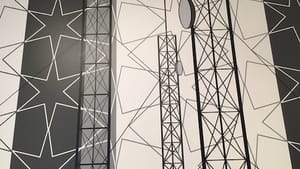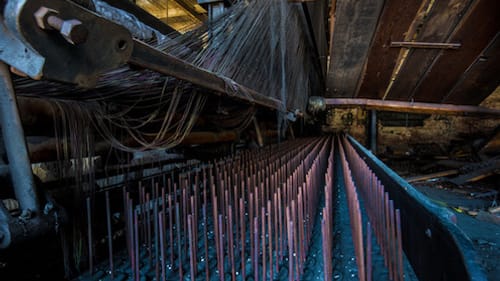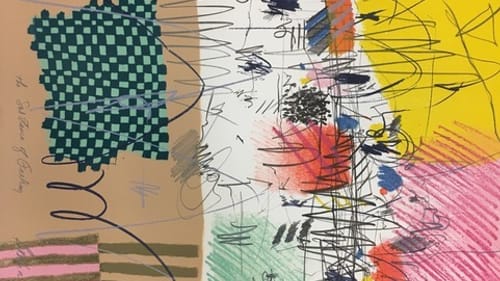Stay in the Loop
BSR publishes on a weekly schedule, with an email newsletter every Wednesday and Thursday morning. There’s no paywall, and subscribing is always free.
Three for the road
Delaware art scene: RH Gallery, Mezzanine Gallery, and the Delaware Contemporary

When it’s hot and humid, a gallery or museum’s steady temperature and humidity preserve both art and sanity. So during the August swelter, I visited three Delaware art spaces: RH Gallery, the Mezzanine Gallery, and the Delaware Contemporary.
RH Gallery: Jonathan Schoff
Hockessin (west of Wilmington) is a small town whose main street is heavily traveled Route 41. One block off that rushing drag, up two flights of exterior steps, hides RH Gallery, an unexpectedly airy space that also houses six studios, owned by Roderick Hidalgo. An artist himself, Hidalgo works in encaustic and polymer, and I was fascinated by a smooth-as-silk cream-colored polymer-coated barrel stave. But I came to see new work by north Philadelphia artist Jonathan Schoff, included in the group exhibition Meta-Force: Large-Scale Works.
By day, Schoff is chief preparator at the Delaware Art Museum. He and his crew mount (and sometimes design) exhibitions — framing, hanging, and lighting art and working with tricky vinyl sheets to create exhibition signage. But Schoff is also a fine artist (many preparators are), as well as a muralist, painter, photographer, and draftsman. I went to see a new work he described as “different for me — big art.” I expected something supersized in one of these media.
It is large — an installation 20 feet long and 8 to 10 feet high (following the shape of the wall), made of finely cut strips of vinyl. Titled Reaching Up Reaching Out, it’s his interpretation of the Roxborough radio-transmission towers, a visual fixture since the 1950s. Given a big, blank space, Schoff blended material he handles daily with structures he sees daily to make this daunting construction of black, white, and grey.
He wove hundreds of perfectly cut half-inch wide (or smaller) vinyl strips to bisect and intersect. Schoff installed it freehand, creating as he worked, requiring a steady hand and immense confidence.
The more you look, the more you marvel. He has other works here, but this is the chef-d'oeuvre.

The Mezzanine Gallery: Shelley Koon
At the largely undistinguished concrete State Office Building in Wilmington, you enter through a sculpture-filled plaza to find a small oasis above the lobby. That’s the Mezzanine Gallery, programmed by Delaware Division of the Arts.
On view is photographer Shelley Koon's Wither: Exploration of the Forgotten, another artist whose day job interfaces with her creations. A graphic designer working for the state’s Department of Transportation, she is a self-described urban explorer.
“Each abandoned place I photograph tells a unique story about the people who once inhabited it,” she says. Her 26 color images do tell a tale. The photos, framed in black, are hung in a straight line on a stark white wall, but the stripped-down installation belies the richness of the images.
Koon is drawn to the tapestry of peeling paint, fractured glass, and otherworldly colors as nature takes back our buildings, and she conveys it in luminous and sometimes ominous digital photographs. Most show the abandoned Scranton Lace Factory, a huge, decaying 19th-century complex.
This mill closed mid-shift in the 1970s, so the traces of the workers’ lives are especially touching: a cobwebbed pair of glasses, coat hangers awry on a rack, a bank of empty lockers, a still-upright, broken-down piano. One of the exhibition’s signature images is a massive 70-foot lace loom, still threaded, its hundreds of looping fibers dripping dust.
Abandoned spaces have rough magic, but alas, this one is no longer. Demolition began at the end of June, so Koon’s beautiful microscopic/telescopic views that both stop time and make it live again are all that’s left for us.
The Delaware Contemporary
The Delaware Contemporary, a non-collecting museum with 26 artists’ studios, resides in a converted industrial building on Wilmington’s Riverfront. At any time, the venue hosts multiple shows by living artists from around the world.

Its current major exhibition is The Figure: The Indicative and The Allusive, 29 works by 22 artists who approach the figure from wide-ranging perspectives. Not a show of portraits, this conceptual exhibition contains work that is allusive or indicative rather than literal — hence the title.
Because the show fills one large room, it takes a moment to settle into its often jostling visual rhythms. Katherine Page, who curated the exhibition, asks that viewers look for “interplay between visual expression and image” and see the multiple interpretations of the body.
One of the show’s pleasures is this thought-provoking mix of representation and abstraction. Carson Zullinger’s Cassowary Dream is a photographic series (nudes and nature) printed on large translucent silk panels that give unexpected movement to static images. Stephen Tanis’s Intersection, a hyperreal oil on canvas, dominates in size, subject matter, and technique.
Sculptors Ellen Durkin and Katee Boyle work in forged steel, an unforgiving material. They comment on femininity by exploring the human form through a three-dimensional absence.
Tendai Johnson, who lived and worked in Zimbabwe, includes Illogic Order, a piece both abstract and representational. It’s at once the largest and smallest work in the room: miniscule pen-and-ink drawings of disembodied faces printed on 7-by-7-inch panels. Mounted in a square, from afar each of the 144 panels — cleverly, a gross — seems to have a dot at the center. Only up close can you see what they are.
Several works merge realism and abstraction. Lynda Schmid’s mixed-media Part/Counterpart juxtaposes a photograph (a woman’s elegantly twisted body) with a drawing of a bending tree. Alex Kanevsky’s Walk-In Closet, with overtones of both Swedish genre painting and 20th-century abstraction, is a beautifully intimate oil on panel of two nudes embracing in a domestic scene.
One of the strongest works in the exhibition is its most abstract. Moe Brooker’s The Substance of Feeling is a small lithograph that, like its contradictory title, captures what seemingly cannot be contained.
The Philadelphia artist has had 35 solo shows over 30 years, and he’s in many national and international collections (including PAFA, the African American Museum, the Kimmel Center, the Woodmere, and the Studio Museum in Harlem). This print may not be large, but emanating from it — and enriching everything around it — is the huge vibrancy of Brooker’s life and vision.
What, When, Where
Meta-Force: Large-Scale Works. Through August 31, 2018, at the RH Gallery, 1304 Old Lancaster Pike, Suite D, Hockessin, Delaware. (302) 377-1989 or rh-gallery.com.
Wither: Exploration of the Forgotten. Photographs by Shelley Koon. Through August 31, 2018, at the Mezzanine Gallery, State Office Building, 820 N. French Street, Fourth Floor, Wilmington, Delaware. Arts.delaware.gov.
The Figure: The Indicative and the Allusive. Through August 26, 2018, at the Delaware Contemporary, 200 S. Madison Street, Wilmington, Delaware. (302) 656-6466 or decontemporary.org.
Sign up for our newsletter
All of the week's new articles, all in one place. Sign up for the free weekly BSR newsletters, and don't miss a conversation.
 Gail Obenreder
Gail Obenreder